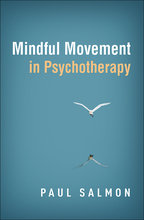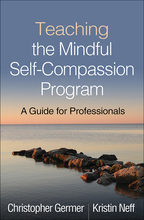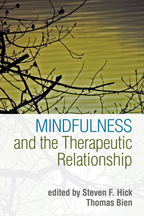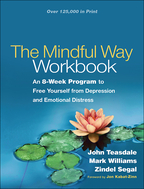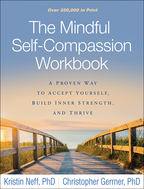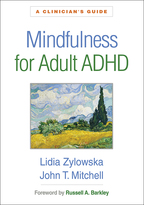Mindful Movement in Psychotherapy
Paul Salmon
HardcoverPaperbacke-bookprint + e-book
Hardcover
orderDecember 19, 2019
ISBN 9781462541881
Price: $65.00 278 Pages
Size: 6" x 9"
Paperback
orderDecember 19, 2019
ISBN 9781462541829
Price: $43.00278 Pages
Size: 6" x 9"
Sign up for emails on upcoming titles on Mindfulness (with special discounts)!
“Finally, a book that elevates movement and the body as vital foci for the training of mindfulness. Expert guidance is presented in an accessible style. Salmon illustrates the transdiagnostic utility of mindful movement and persuasively invites the therapist to incorporate these practices into the full spectrum of clinical work.”

—Zindel Segal, PhD, Distinguished Professor of Psychology in Mood Disorders, University of Toronto–Scarborough, Canada
“Many clinicians mistakenly believe that mindfulness is about sitting still. A psychologist, exercise physiologist, and yoga teacher, Salmon skillfully shows—drawing on solid research and a plethora of practices—that attention to the body is an accessible and safe way to practice mindful awareness. This is an excellent resource for therapists who want to share mindful movement with their clients in order to enhance treatment and promote health.”

—Susan M. Pollak, MTS, EdD, Cofounder, Center for Mindfulness and Compassion, Harvard Medical School/Cambridge Health Alliance
“A 'must read' for any mental health professional interested in taking a holistic approach to wellness. This work pulls together relevant research from clinical psychology, medicine, and the exercise sciences to highlight the overwhelming evidence for the benefits of getting our bodies back in motion. Mindful Movement in Psychotherapy includes an eloquent mindfulness-based rationale for how and why to get clients curious about their innate capacity to move. A range of concrete examples—from session excerpts to suggestions on how to frame interventions to easy-to-follow in vivo exercises—will allow any clinician to immediately begin harnessing the power of movement to help clients.”

—Tim Pineau, PhD, Cofounder, MSPE Institute (Mindful Sport Performance Enhancement), Washington, DC
“Experienced teachers and practitioners know that mindfulness has more to do with the body than it does with our conventional ideas of our 'minds.' This wonderful book helps psychotherapists take mindfulness beyond the artificial limits of a therapy setting, to help clients practice living mindfully as fully embodied and engaged human beings. This isn’t just a book to read—it is a book to live.”

—Dennis Tirch, PhD, Founding Director, The Center for Compassion Focused Therapy, New York City
“A 'must read' for any health professional incorporating mindfulness into treatment, this book offers a fresh take on the topic. Salmon offers practitioners numerous creative exercises—therapeutic invitations to move—that can be meaningfully used to help treat common problems, such as stress and anxiety, as well as more complex issues, such as addiction and eating disorders.”

—Diane R. Gehart, PhD, LMFT, Marriage and Family Therapy Program, California State University, Northridge
“As both a scholar of mindfulness in sport and a practitioner with elite athletes, I have been waiting for a book like this. One of the pedagogical challenges of working with athletes is to transform traditional mindfulness into the sport context. This book is a very valuable addition to the literature, and I will warmly recommend it to my colleagues and doctoral students.”

—Henrik Gustafsson, PhD, Faculty of Arts and Social Science, Karlstad University, Sweden, and sport psychology consultant
—Zindel Segal, PhD, Distinguished Professor of Psychology in Mood Disorders, University of Toronto–Scarborough, Canada
“Many clinicians mistakenly believe that mindfulness is about sitting still. A psychologist, exercise physiologist, and yoga teacher, Salmon skillfully shows—drawing on solid research and a plethora of practices—that attention to the body is an accessible and safe way to practice mindful awareness. This is an excellent resource for therapists who want to share mindful movement with their clients in order to enhance treatment and promote health.”
—Susan M. Pollak, MTS, EdD, Cofounder, Center for Mindfulness and Compassion, Harvard Medical School/Cambridge Health Alliance
“A 'must read' for any mental health professional interested in taking a holistic approach to wellness. This work pulls together relevant research from clinical psychology, medicine, and the exercise sciences to highlight the overwhelming evidence for the benefits of getting our bodies back in motion. Mindful Movement in Psychotherapy includes an eloquent mindfulness-based rationale for how and why to get clients curious about their innate capacity to move. A range of concrete examples—from session excerpts to suggestions on how to frame interventions to easy-to-follow in vivo exercises—will allow any clinician to immediately begin harnessing the power of movement to help clients.”
—Tim Pineau, PhD, Cofounder, MSPE Institute (Mindful Sport Performance Enhancement), Washington, DC
“Experienced teachers and practitioners know that mindfulness has more to do with the body than it does with our conventional ideas of our 'minds.' This wonderful book helps psychotherapists take mindfulness beyond the artificial limits of a therapy setting, to help clients practice living mindfully as fully embodied and engaged human beings. This isn’t just a book to read—it is a book to live.”
—Dennis Tirch, PhD, Founding Director, The Center for Compassion Focused Therapy, New York City
“A 'must read' for any health professional incorporating mindfulness into treatment, this book offers a fresh take on the topic. Salmon offers practitioners numerous creative exercises—therapeutic invitations to move—that can be meaningfully used to help treat common problems, such as stress and anxiety, as well as more complex issues, such as addiction and eating disorders.”
—Diane R. Gehart, PhD, LMFT, Marriage and Family Therapy Program, California State University, Northridge
“As both a scholar of mindfulness in sport and a practitioner with elite athletes, I have been waiting for a book like this. One of the pedagogical challenges of working with athletes is to transform traditional mindfulness into the sport context. This book is a very valuable addition to the literature, and I will warmly recommend it to my colleagues and doctoral students.”
—Henrik Gustafsson, PhD, Faculty of Arts and Social Science, Karlstad University, Sweden, and sport psychology consultant

